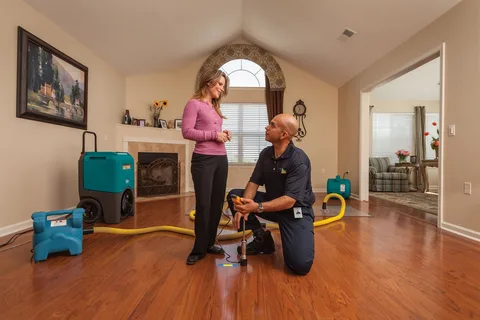In Sydney, floods can occur with little warning, leaving a trail of destruction in their wake. These natural disasters disrupt lives and cause extensive property damage. The Sydney Flood Restoration process is crucial for returning life to normalcy and mitigating the effects of future floods.
Understanding the Impact of Floods in Sydney
Sydney, nestled between the Pacific Ocean and the Blue Mountains, boasts a beautiful and vulnerable landscape. The city’s proximity to vast water bodies and its diverse topography make it prone to flooding, which can wreak havoc on urban and rural settings, especially during heavy rainfalls. The repercussions of such natural disasters are multifaceted, affecting the community in numerous ways.
When subjected to floodwaters, buildings may suffer from compromised structural integrity, leading to costly repairs or, in severe cases, total loss. Electrical systems exposed to water pose serious hazards, demanding immediate and expert attention to prevent accidents. Furthermore, the contamination of water supplies during floods introduces a spectrum of health risks, from waterborne diseases to chemical exposure, complicating the recovery process for the affected populace.
The economic impact is equally significant, with businesses facing temporary closures and the broader economy absorbing the shock of reduced productivity and increased recovery expenses. This disruption extends beyond the immediate aftermath as communities strive to rebuild and restore normalcy. Understanding these impacts is pivotal for Sydney’s residents, equipping them with the knowledge to prepare for and respond to flooding..
Immediate Steps to Take Post-Flooding
In the unsettling aftermath of a flood, it is paramount for individuals to act swiftly yet judiciously to limit further harm. The initial step involves ensuring the safety of all occupants by relocating to a secure location away from the floodwaters whilst also being cautious around electrical devices and outlets to prevent accidents. Prompt documentation of the extent of damage is crucial; photographs and meticulous records serve as invaluable evidence for insurance purposes.
Commencing the removal of water and initiating the drying process as expeditiously as possible is critical to curtail the proliferation of mould, which poses significant health risks and can exacerbate damage to the property’s structure. Engaging the expertise of professionals specialising in flood restoration services within Sydney is highly recommended to conduct a thorough assessment and commence the repair works efficiently. These experts are adept at navigating the complexities associated with flood damage, promptly ensuring that the property is restored to a habitable state.
Professional Flood Restoration Services in Sydney
In the aftermath of a flood, professional flood restoration services become indispensable for Sydney’s affected residents and business owners. These entities offer a suite of services designed to address the various challenges of flood damage, ensuring a comprehensive restoration process. Using state-of-the-art equipment and extensive experience, these professionals efficiently tackle water extraction, drying out properties, repairing structural damage, and conducting mould remediation.
Key to their approach is a thorough assessment of the damage incurred, which allows for a tailored strategy to be developed for each unique situation. This may include prioritising areas of a property that are most vulnerable or at risk of long-term damage if not immediately addressed. By employing advanced techniques, such as thermal imaging, to detect moisture hidden within walls and floors, these experts can prevent potential issues before they escalate into more serious problems.
Selecting a reputable flood restoration provider in Sydney requires due diligence. Recommendations from insurance companies, reviews from past clients, and evidence of accreditation or certification can indicate a company’s reliability and expertise. Moreover, engaging with a service that is well-versed in the intricacies of insurance claims can offer additional support to property owners navigating the complexities of filing claims and securing fair compensation for damages.
Navigating insurance claims for flood damage presents a challenge that requires prompt and informed action. Individuals affected by flooding should immediately contact their insurance provider to initiate the claims process, ensuring a timely response. It is vital to meticulously document the extent of the damage, capturing it through photographs and detailed notes. These records will be crucial when substantiating the claim.
Collaboration with professionals skilled in flood restoration can further bolster one’s case, as they can provide comprehensive assessments that detail the damage in a manner that insurance companies recognise and respect. Understanding the specific terms and coverage limits of one’s insurance policy before disaster strikes is beneficial. This pre-emptive knowledge aids in setting realistic expectations regarding what damages are covered and to what extent.
Insurance providers often have specific procedures and requirements for filing claims related to flood damage. Familiarity with these protocols can streamline the process, making it less daunting for the claimant. While the journey through insurance claims can be complex, with careful preparation and a proactive approach, individuals can navigate it more smoothly, securing the necessary funds for restoration and recovery.
The Role of Government and Community Support
In the aftermath of flooding, the support provided by government bodies and community organisations becomes an invaluable asset for those affected in Sydney. Their roles extend from immediate disaster response to longer-term recovery and resilience building.
Emergency Response and Relief
Government agencies spearhead rescue operations, providing shelter and essential supplies to those displaced. Immediate financial assistance is also available to support affected individuals and families during the initial recovery phase.
Infrastructure Repair and Restoration
Significant resources are allocated to repairing damaged infrastructure after the flood. This includes roads, bridges, and public utilities, ensuring a swift return to normality and reducing future flood vulnerability.
Health and Safety Measures
Public health campaigns are launched to address the risks of contaminated water and the spread of waterborne diseases. Mobile health units may be deployed to offer medical aid and vaccinations.
Community Outreach and Support Services
Local councils and organisations facilitate access to counselling, legal advice, and rebuilding assistance. These services aim to support emotional well-being and guide residents through the complexities of recovery.
Flood Mitigation and Education
Government and community groups collaborate on initiatives to enhance flood preparedness. This encompasses educational programmes, the development of floodplain management plans, and the investment in sustainable urban planning to mitigate future risks.
Long-Term Strategies for Flood Mitigation in Sydney
Adopting long-term mitigation strategies is vital for minimising the impact of future floods in Sydney. These strategies encompass a variety of approaches aimed at enhancing the resilience of both the built and natural environments. Infrastructure improvements play a key role, with investments in enhanced drainage systems to facilitate more efficient water runoff and the construction of flood barriers to protect vulnerable areas. Additionally, reinforcing embankments and developing retention basins can significantly reduce floodwater levels during severe weather events.
Stringent building codes must be enforced in areas particularly susceptible to flooding. These regulations should mandate the use of flood-resistant materials and designs, such as elevated foundations and water-resistant barriers, to minimise property damage. Public awareness campaigns are also crucial, equipping residents with the knowledge and tools to prepare for and respond to flood risks.
Sustainable environmental management constitutes another cornerstone of long-term flood mitigation. Preserving and restoring natural waterways and wetlands are imperative, as these ecosystems act as natural buffers, absorbing and slowing down floodwaters. Urban planning that integrates green spaces and permeable surfaces can further aid in reducing runoff and enhancing the absorption of rainwater.
Flood Restoration Sydney: Keeping Your Home Safe from Future Floods
In pursuing fortifying homes against the ravages of future floods, Sydney residents are turning towards more robust Flood Restoration Sydney practices. A key aspect of this endeavour involves strategically retrofitting properties with materials resilient to water damage. Such measures include:
- The application of waterproof sealants on walls.
- The installation of non-porous flooring.
- The use of stainless steel appliances that can withstand water exposure without corroding.
Another vital preventive strategy is the installation of sump pumps and backwater valves. Sump pumps actively remove water that accumulates around a home’s foundation, thereby preventing basement flooding. On the other hand, backwater valves are designed to close automatically in the event of a sewer backup, protecting the home’s interior from sewage overflow during heavy rainfall.
Engaging with flood restoration specialists with the expertise to assess a property’s vulnerability to floods is invaluable. These professionals can offer tailored advice and solutions, ensuring homeowners can implement the most effective measures for their circumstances. Through these concerted efforts, properties in Sydney can be better protected from the devastating effects of future floods, contributing to a safer, more resilient community.
Ensuring Water Quality in Post-Flood Sydney
In the aftermath of flooding, Sydney faces a critical public health challenge in safeguarding its water supplies from contamination. Floodwaters, rich in pathogens and hazardous chemicals, threaten to compromise the purity of drinking water, posing severe health risks to the community. The urgent need for clean water necessitates immediate and effective measures to ensure the safety of the water supply.
Initially, residents are advised to rely on bottled water for drinking and cooking. If bottled water is unavailable, boiling tap water is a practical short-term solution until local health authorities confirm the safety of the municipal water supply. This precautionary step is essential in preventing waterborne illnesses that can spread rapidly after a flood. Enhancing the resilience of water treatment facilities and distribution networks is paramount for long-term water safety.
Additionally, regular water quality monitoring plays a crucial role in early contamination detection. Such vigilance allows for swift response measures, including issuing timely warnings to the public and initiating cleanup efforts. Community education on the importance of water safety post-flood also contributes to a proactive approach, empowering residents with the knowledge to protect themselves and their families.
FAQ’s
What immediate actions should be taken following a flood in Sydney?
Individuals are advised to prioritise safety by avoiding electrical equipment and documenting the damage for insurance claims. It is imperative to commence the drying-out process quickly to thwart mould growth.
How do Flood Restoration Sydney services in Sydney address flood damage?
Flood Restoration Sydney employ state-of-the-art techniques for water extraction, structural repairs, and mould remediation, tailoring their approach based on a detailed damage assessment.
Can flood restoration efforts help in preventing future floods?
While restoration focuses on repairing current damage, professionals can offer advice and modify properties that minimise future flood risk, such as installing sump pumps or waterproofing basements.
Insurance is crucial for covering damages. Policyholders should document all damages and maintain open communication with their insurer, understanding their policy’s specifics to streamline the claims process.
Are there community and government supports available for flood-affected individuals in Sydney?
Yes, local councils, state governments, and community organisations offer emergency accommodation, financial aid, and practical assistance to those impacted by flooding, underscoring the importance of collective support in times of disaster.
Conclusion
In conclusion, Sydney Flood Restoration encompasses a multifaceted approach, addressing both immediate damage and long-term preventative measures. Through the expertise of professionals, the support of insurance and government bodies, and the community’s resilience, Sydney can navigate the aftermath of floods with determination. By understanding the intricacies of flood restoration, embracing strategic mitigation techniques, and ensuring the safety of water supplies, the city is well-equipped to restore peace and security to its flood-affected areas.
| Other Good Articles to Read |
| Blogs-Peoples |
| Bryan Smith Blogs |
| intellect blogs |
| the fault in our blogs |
| blogs eu |
| oz forums |
| recruitment blogs |
| zet blogs |
| id blogs |
| Blog Studio legale |
| blogs map |
| Related Business Listings |
| Contact Directory |
| Local Business Profiles |

